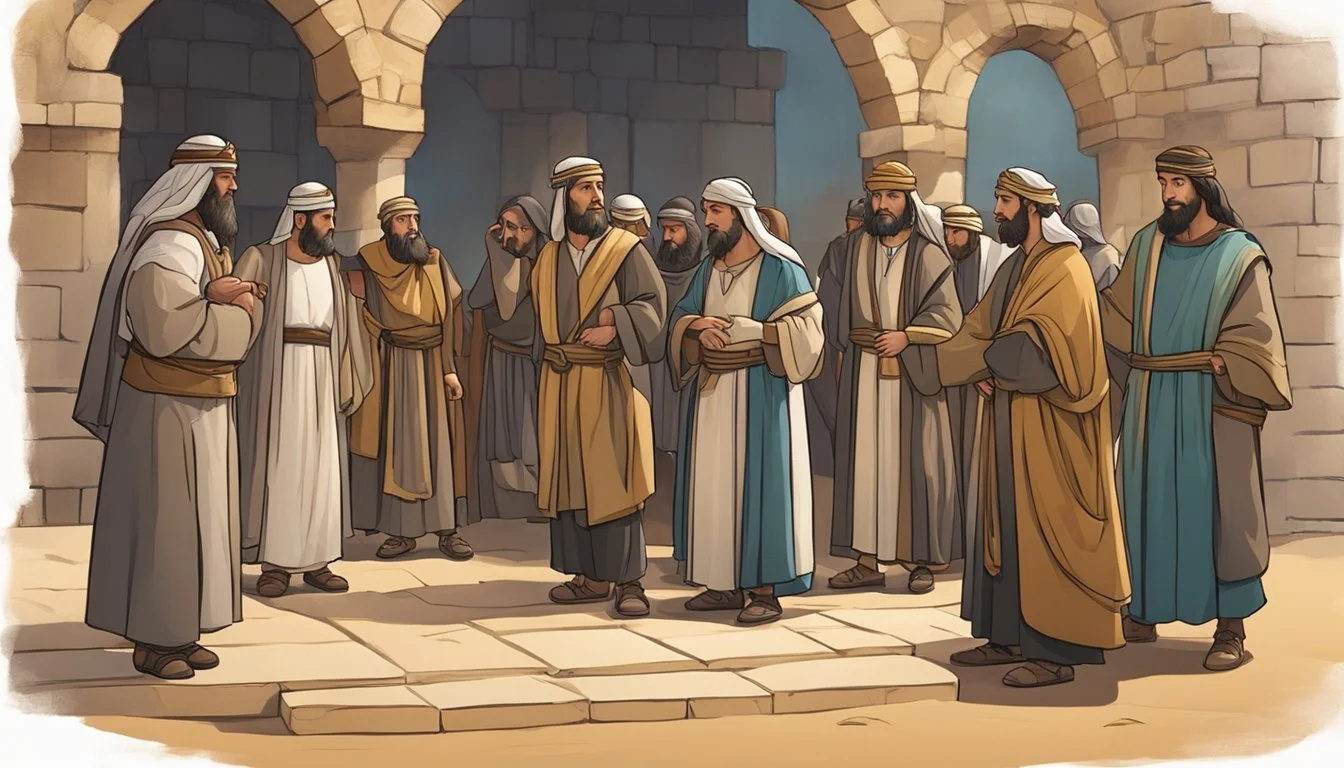Comparisons to 'The Chosen': How 'Testament' Fits into the Biblical Drama Trend
Analyzing Faith-Based Entertainment's Latest Entry
Biblical dramas have gained significant popularity in recent years, with "The Chosen" leading the charge as a crowd-funded phenomenon. This series, which explores the life of Jesus and his disciples, has set a new standard for faith-based entertainment. As the genre expands, newcomers like "Testament" are entering the arena, aiming to capture audiences with their own interpretations of biblical narratives.
"Testament" joins a growing trend of television shows and films that seek to bring ancient stories to life for modern viewers. While "The Chosen" focuses on the ministry of Jesus, "Testament" takes a broader approach, covering various stories from the Old and New Testaments. This wider scope allows "Testament" to explore different characters and events, potentially appealing to a diverse audience interested in biblical history.
Both series face the challenge of balancing historical accuracy with creative storytelling. They must navigate the delicate task of filling in narrative gaps while remaining true to the spirit of the source material. As viewers compare these productions, they will likely assess how each show handles this balance and which approach resonates more strongly with their personal faith and understanding of biblical texts.
The Resurgence of Biblical Drama
Biblical dramas have experienced a revival in recent years, captivating audiences with fresh perspectives on ancient stories. This trend has been propelled by innovative storytelling techniques and the rise of streaming platforms.
Contextualizing the Trend
Biblical dramas are not a new phenomenon, but their recent resurgence marks a shift in approach and audience engagement. Shows like "The Chosen" and "Testament" have embraced modern production values and narrative structures to bring biblical stories to life. These series aim to humanize biblical figures, making them relatable to contemporary viewers.
Streaming platforms have played a crucial role in this revival. They offer more creative freedom and allow for serialized storytelling, which suits the complex narratives found in biblical texts. This format enables deeper character development and exploration of historical context.
The Chosen and Testament's Place in Contemporary Faith-Based Media
"The Chosen" has set a new standard for biblical dramas, focusing on the life of Jesus and his disciples. Its success has paved the way for other series like "Testament" to explore different aspects of biblical narratives. These shows blend faithful representation of scripture with creative interpretation.
Both series aim to strike a balance between adherence to biblical texts and dramatic storytelling. They often incorporate elements from both the Old and New Testaments, providing a comprehensive view of biblical history. This approach has resonated with Christian audiences and attracted viewers from diverse backgrounds.
The success of these shows has demonstrated a strong market for high-quality, faith-based content. They have also sparked discussions about the interpretation of scripture and the role of media in modern Christian faith.
Cinematic Portrayals of Scriptural Accounts
Biblical dramas like "The Chosen" and "Testament" navigate a delicate balance between faithfulness to scripture and creative interpretation. These series aim to bring ancient texts to life while grappling with historical context and artistic vision.
Narrative Fidelity to the Gospels
"The Chosen" strives to adhere closely to Gospel accounts while expanding character backstories. The series depicts well-known miracles such as Jesus turning water into wine and feeding the 5000 in ways that align with biblical descriptions.
"Testament" similarly draws from New Testament narratives, focusing on the lives of Jesus and his disciples. Both shows use creative license to fill gaps in the biblical record, imagining conversations and personal moments not explicitly detailed in scripture.
Producers of these series often include disclaimers, reminding viewers that while inspired by the Bible, the shows are dramatizations rather than literal retellings.
Historical Accuracy Versus Artistic License
Biblical dramas face the challenge of recreating ancient settings while engaging modern audiences. "The Chosen" and "Testament" invest in period-appropriate costumes, sets, and cultural details to enhance authenticity.
However, these productions also take artistic liberties to develop characters and storylines. They may portray disciples with more complex personalities or explore hypothetical scenarios not mentioned in the Gospels.
Critics debate the merits of such adaptations. Supporters argue these artistic choices make biblical figures more relatable, while others worry about potential misrepresentation of scripture.
Ultimately, these series serve as historical dramas rather than documentaries, blending factual elements with creative storytelling to bring ancient texts to life on screen.
Character and Story Development
'Testament' follows in the footsteps of 'The Chosen' by focusing on character depth and narrative arcs. It aims to bring biblical figures to life through relatable portrayals and compelling storylines.
Relatable Characters and Their Journeys
'Testament' introduces viewers to familiar faces from the Book of Acts, presenting them as multidimensional individuals. The series explores the personal struggles and growth of characters like Peter and Paul. Peter grapples with his role as a leader, while Paul transforms from persecutor to apostle.
The show depicts Mary Magdalene's continued devotion to spreading Jesus' message. Matthew's journey as a former tax collector turned disciple is further developed. These character arcs help audiences connect emotionally with biblical figures.
Development of Key Figures
The series delves into the apostles' backgrounds, motivations, and relationships. John the Baptist's influence on the early church is examined. Paul's dramatic conversion and subsequent missionary journeys take center stage.
'Testament' portrays the apostles' doubts, fears, and triumphs as they navigate their new roles. The show highlights their human qualities while demonstrating their faith and commitment to God's plan.
Incorporation of Lesser-Known Biblical Personas
'Testament' introduces viewers to lesser-known figures from the early church. Characters like Priscilla, Aquila, and Timothy are given more screen time and backstory. The series explores their contributions to the spread of Christianity.
By fleshing out these supporting characters, 'Testament' creates a richer narrative tapestry. It shows how ordinary people played crucial roles in extraordinary events. This approach adds depth to the biblical world and helps viewers understand the wider impact of the apostles' ministry.
Creative Approaches to Depicting the Divine
Biblical dramas employ various techniques to portray the divine while maintaining relatability. These approaches balance reverence with human connection, bringing ancient stories to life for modern audiences.
Representation of Jesus of Nazareth
"The Chosen" and "Testament" take different paths in depicting Jesus. "The Chosen" portrays Jesus as both divine and deeply human, showing His everyday interactions and relationships. This approach aims to make Jesus more relatable to viewers.
"Testament" focuses on Jesus' public ministry, emphasizing His teachings and miracles. The series presents a more traditional representation, aligning closely with Gospel accounts.
Both shows use costume design and setting to create an authentic first-century atmosphere. They employ skilled actors to convey Jesus' charisma and compassion, drawing viewers into His world and message.
Portrayal of Miracles and Teachings
Biblical dramas face the challenge of depicting miraculous events convincingly. "The Chosen" often shows miracles through the eyes of witnesses, capturing their awe and disbelief. This approach allows viewers to experience the wonder alongside the characters.
"Testament" takes a more direct approach, presenting miracles as they unfold. The series uses visual effects to bring these supernatural events to life, balancing spectacle with reverence.
Both shows incorporate Jesus' teachings through dialogue and sermons. They often frame these moments within relatable contexts, helping viewers connect ancient wisdom to modern life. The series use secondary characters to explore the impact of Jesus' words, showing how His message transforms lives.
Analyzing 'Testament' in Light of 'The Chosen'
'Testament' and 'The Chosen' take distinct approaches in their portrayal of biblical narratives, offering unique perspectives on familiar stories. Both series aim to bring ancient texts to life for modern audiences through creative storytelling and character development.
Comparison of Jesus' Depiction
'The Chosen' presents Jesus as relatable yet divine, exploring his early life and interactions. 'Testament' takes a different angle, focusing on Jesus' public ministry and its impact on his followers.
In 'The Chosen', Jesus is shown as a carpenter in Nazareth, with glimpses into his family life. This portrayal humanizes him while maintaining his spiritual authority.
'Testament' emphasizes Jesus' role as a teacher and miracle worker. It highlights his teachings and their effect on disciples and crowds.
Both series strive to balance historical accuracy with creative interpretation. They aim to make Jesus' character accessible to contemporary viewers without diminishing his theological significance.
Diverse Casting and Its Cultural Impact
'The Chosen' and 'Testament' embrace diverse casting choices, reflecting a modern understanding of the multicultural nature of ancient Judea. This approach has significant cultural implications.
'The Chosen' features actors from various ethnic backgrounds, challenging traditional Western depictions of biblical figures. This diversity has sparked discussions about representation in religious media.
'Testament' follows suit, presenting a cast that reflects the historical diversity of the region. This choice aids in creating a more authentic visual representation of the time period.
Both series' casting decisions have been praised for increasing inclusivity and allowing a wider audience to connect with the stories. They've also faced some criticism from those preferring more traditional portrayals.
Reflection on the Depiction of Faith and Redemption
'The Chosen' and 'Testament' tackle themes of faith and redemption, central to Christian theology, in their storytelling. Their approaches offer viewers different lenses through which to examine these concepts.
'The Chosen' often focuses on personal transformations, like Mary Magdalene's journey from demon possession to discipleship. It emphasizes individual encounters with Jesus and their life-changing effects.
'Testament' tends to explore faith and redemption on a broader scale, examining how Jesus' teachings impact communities. It delves into the struggles of characters grappling with their beliefs in the face of adversity.
Both series aim to make these theological concepts relatable to modern audiences. They use character development and dramatic storytelling to illustrate the transformative power of faith and the possibility of redemption.
Behind the Scenes
The creative process behind biblical dramas like "The Chosen" and "Testament" involves meticulous planning and innovative approaches. From assembling talented teams to securing funding and ensuring historical accuracy, these productions face unique challenges.
Role of the Creative Team
Dallas Jenkins, creator of "The Chosen," leads a dedicated group of writers, directors, and consultants. They collaborate closely to craft compelling narratives while maintaining biblical integrity. The team conducts extensive research to balance historical context with relatable character development.
Theological advisors play a crucial role in guiding creative decisions. They ensure that dialogue and plot points align with scriptural teachings. This collaborative approach helps maintain authenticity while allowing for artistic interpretation.
The creative team also focuses on character arcs, weaving together familiar biblical stories with imaginative backstories. This approach aims to make ancient figures more accessible to modern audiences.
Innovations in Crowdfunding and Production
"The Chosen" pioneered a unique crowdfunding model for faith-based content. This approach allowed fans to become partners in the production process. The show's success demonstrated the viability of this funding method for biblical dramas.
Production techniques have evolved to meet the demands of these ambitious projects. Filmmakers utilize cutting-edge technology to recreate ancient settings convincingly. Green screens and CGI enhance the visual experience without compromising historical accuracy.
Seasons 1-3 of "The Chosen" saw steady improvements in production value. As the show gained popularity, it attracted more resources and talent. This growth pattern is likely to influence future biblical drama productions.
Authenticity in Costumes and Locations
Costume designers meticulously research ancient clothing styles to ensure accuracy. They source authentic materials and employ traditional techniques to create garments that look lived-in and period-appropriate.
Location scouts seek out settings that can convincingly double as first-century Israel. When suitable locations are unavailable, production designers construct elaborate sets. These efforts create immersive environments that transport viewers to the biblical era.
Attention to detail extends to props and set dressing. Teams work to eliminate historical anachronisms, ensuring that every object on screen is period-accurate. This commitment to authenticity helps maintain the illusion of stepping back in time.
Theological Insights and Challenges
Biblical dramas like "The Chosen" and "Testament" prompt viewers to grapple with theological concepts through storytelling. These shows navigate the delicate balance between entertainment and faithful representation of scripture.
Theology Through the Lens of Entertainment
"The Chosen" blends faith and creativity, challenging viewers to see the Gospels from a fresh perspective. The show's portrayal of Jesus and his disciples adds depth to familiar biblical narratives. It explores the humanity of characters like Mary Magdalene, providing insight into their devotion to Jesus.
"Testament" likely follows a similar approach, using drama to illuminate theological themes. These shows can make abstract concepts more accessible. They may depict characters wrestling with faith, doubt, and divine encounters.
Assessing Theological and Scriptural Interpretation
Evaluating the biblical fidelity of these dramas is crucial. "The Chosen" employs theological experts to guide its scriptural interpretation. This helps maintain a balance between storytelling and biblical accuracy.
Viewers and critics assess how faithfully the shows represent biblical dialogue and events. They examine whether added backstories or character developments align with scripture. Some may question dramatized depictions of Jesus' ministry or miracles.
These productions often incorporate cultural and historical context to enhance understanding of biblical times. This can provide valuable insights but requires careful research to avoid misrepresentation.
Reception and Impact
"Testament" has garnered attention from both religious and secular audiences, sparking discussions about its portrayal of biblical stories. The show's reception varies among different viewer groups, with critics and audiences offering diverse perspectives on its approach to religious narratives.
Critical Reviews and Audience Reception
"Testament" has received mixed reviews from critics. Some praise its production values and fresh take on familiar biblical tales. Others question its historical accuracy and creative liberties. Audience reactions have been largely positive, with many appreciating the show's engaging storytelling and character development.
The series has drawn comparisons to "The Chosen," with viewers noting similarities and differences in their approaches. "Testament" has seen steady growth in viewership since its debut, though it has not yet reached the same level of popularity as "The Chosen."
Ratings for "Testament" have improved with each season. Season 3 saw a notable increase in audience engagement, particularly on social media platforms.
Influence on Religious and Non-Religious Viewers
"Testament" has had a significant impact on its religious viewership. Many faith communities have embraced the show, using it as a tool for discussion and reflection. Some churches have incorporated "Testament" into their study groups and youth programs.
The series has also attracted non-religious viewers, sparking interest in biblical narratives among secular audiences. This crossover appeal has contributed to broader cultural conversations about faith, history, and storytelling.
"Testament" has influenced the way some viewers perceive biblical figures, humanizing characters that were previously seen as distant or one-dimensional. This approach has both supporters and critics within religious circles.
The Future of Faith-Based Entertainment
Faith-based entertainment is evolving rapidly, with new storytelling approaches and distribution methods reshaping the landscape. Streaming platforms are playing a pivotal role in expanding audience reach.
Predictions and Expectations
Biblical dramas are likely to explore lesser-known narratives and characters. Shows may delve deeper into the lives of disciples, examining events like the calling of Peter in Matthew 4:18-22. Streaming services will continue to invest in faith-based content, recognizing its growing appeal.
Production values are expected to rise, matching mainstream entertainment standards. This trend could attract top-tier talent both in front of and behind the camera.
Interfaith collaborations may increase, fostering broader perspectives on biblical stories. Such partnerships could lead to more nuanced portrayals of historical and cultural contexts.
Potential Storylines and Biblical Episodes
Future series might focus on the early Christian church, as depicted in Acts. The struggles and triumphs of the apostles could provide compelling drama.
Adaptations of less frequently portrayed miracles, like the healing of the paralytic in Mark 2:1-12, may offer fresh narratives. These stories could highlight themes of faith, community, and personal transformation.
The Crucifixion might be explored from multiple perspectives, including those of Roman soldiers or bystanders. This approach could provide new insights into this pivotal event.
Series may also venture into Old Testament stories, reimagining them for modern audiences. The life of King David or the prophecies of Isaiah could offer rich material for long-form storytelling.









